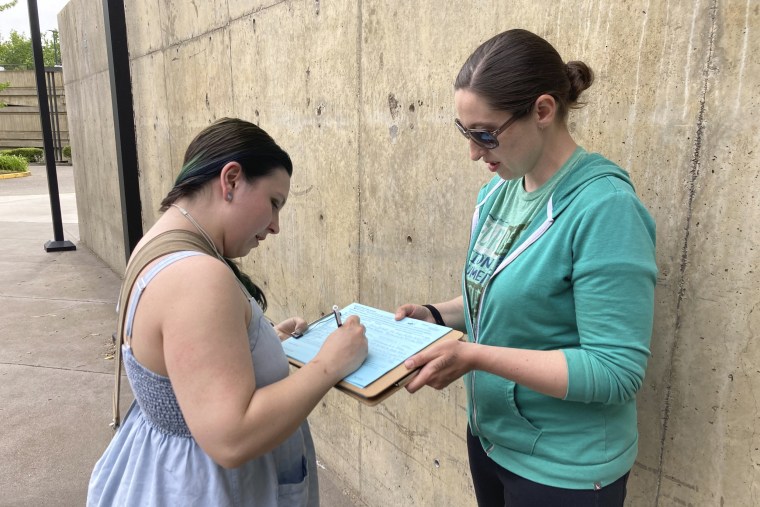A citizen-led effort to institute new gun safety rules and ban high-capacity magazines has taken off in Oregon after mass shootings last month in Uvalde, Texas, and Buffalo, New York, mobilized volunteers and voters.
A group of faith leaders known as the Lift Every Voice Oregon coalition are gathering signatures to try to get a measure, Initiative Petition 17, on November's ballot. If approved by voters, it would ban high-capacity magazines of more than 10 rounds and require prospective gun buyers to take out a permit, undergo safety training and pass a background check before buying a firearm.
While the effort is years in the making — faith leaders said they first started considering a ballot initiative in 2018 after the Parkland, Florida, shooting — the racist shooting at supermarket in Buffalo, New York, where 10 people where killed, and the massacre of 19 children and two teachers at an elementary school in Uvalde, Texas, supercharged their campaign. By early May, the group had 35,000 signatures.
As of Monday, they've gathered 114,000 signatures — 30,000 in the last week alone, according to organizers. That's more than the minimum of 112,020 signatures of registered voters they need to be able to put the proposal on Oregon's ballot this year, but organizers say they're working to get more than 140,000 by the end of next week.
“People are grieving and sad — what can we do, what can we do? And they realized in Oregon, we’ve got real legislation that could be a bellwether for the nation on what everyday people can do,” said the Rev. W. J. Mark Knutson, chair of the campaign. “The energy is off the charts.”
Volunteers have signed up in droves: The coalition now counts 1,500 active volunteers, up from 450 before the shootings, ranging in ages from a 12-year-old student to a 94-year-old recent widower. The basement of Knutson’s church used to have a few volunteers packing up packets of petitions for volunteers across the state; now there’s more than 20 volunteers there a day, according to organizers. Thousands of signatures have come in from people who downloaded and printed the petition at home and signed independently, filling up the group’s suddenly too-small P.O. Box every day.

Penny Okamato, a longtime gun restriction activist who is involved in the Lift Every Voice Oregon coalition, said the measure is the "most exciting piece of legislation I have ever worked with."
She said the word “momentum” doesn't quite capture what's happening with the petition; she said people are “nauseous” with fear.
“They know that legislators are not going to do anything because they got away with not doing anything after Sandy Hook,” she said of Congress. “They’re desperate to get something done, and they’re willing to do it themselves.”
To pose a question to voters in Oregon, citizens must get ballot language approved by the attorney general — and state Supreme Court if there are challenges — and then gather a significant number of signatures in support of it.
“We saw just a complete inaction on gun violence prevention laws, the kinds of things that would really make a difference,” said Rabbi Michael Cahana, another one of the coalition's leaders. “There was a sense of hopelessness, and as faith leaders, we believe in hope.”
Lift Every Voice Oregon won approval for its initiative proposal text in November; it has until July 8 to gather the requisite number of signatures.
Oregon is one of 26 states with a ballot initiative process, and Knutson said he believes other states will consider taking action as they have to pass safety legislation that legislatures have declined to enact.
"It's already been called the 'Oregon model' by groups who are similar in thinking with us around the country," Knutson said.
Okamato, who is the executive director of gun safety group Ceasefire Oregon, said Oregon already requires background checks, but gun sales are allowed to go through if a background check isn’t completed after three business days. This is often called the "Charleston loophole," a reference to the racist murders in 2015 of nine worshippers at a Black church in Charleston, South Carolina, by a young white shooter who obtained a gun that way.
She said the specifics of the ballot measure are popular but have been difficult to enact in Oregon, where Democrats control both chambers of the Legislature. The governor is also a Democrat.
“We tried to close the Charleston loophole in 2015, 2017, 2019 and 2021,” she said, pointing to failed bills in four different sessions and adding that activists had urged the governor to take executive action twice. “I myself do not understand why legislation that polls with such high popularity is difficult to pass in the Oregon Legislature.”
